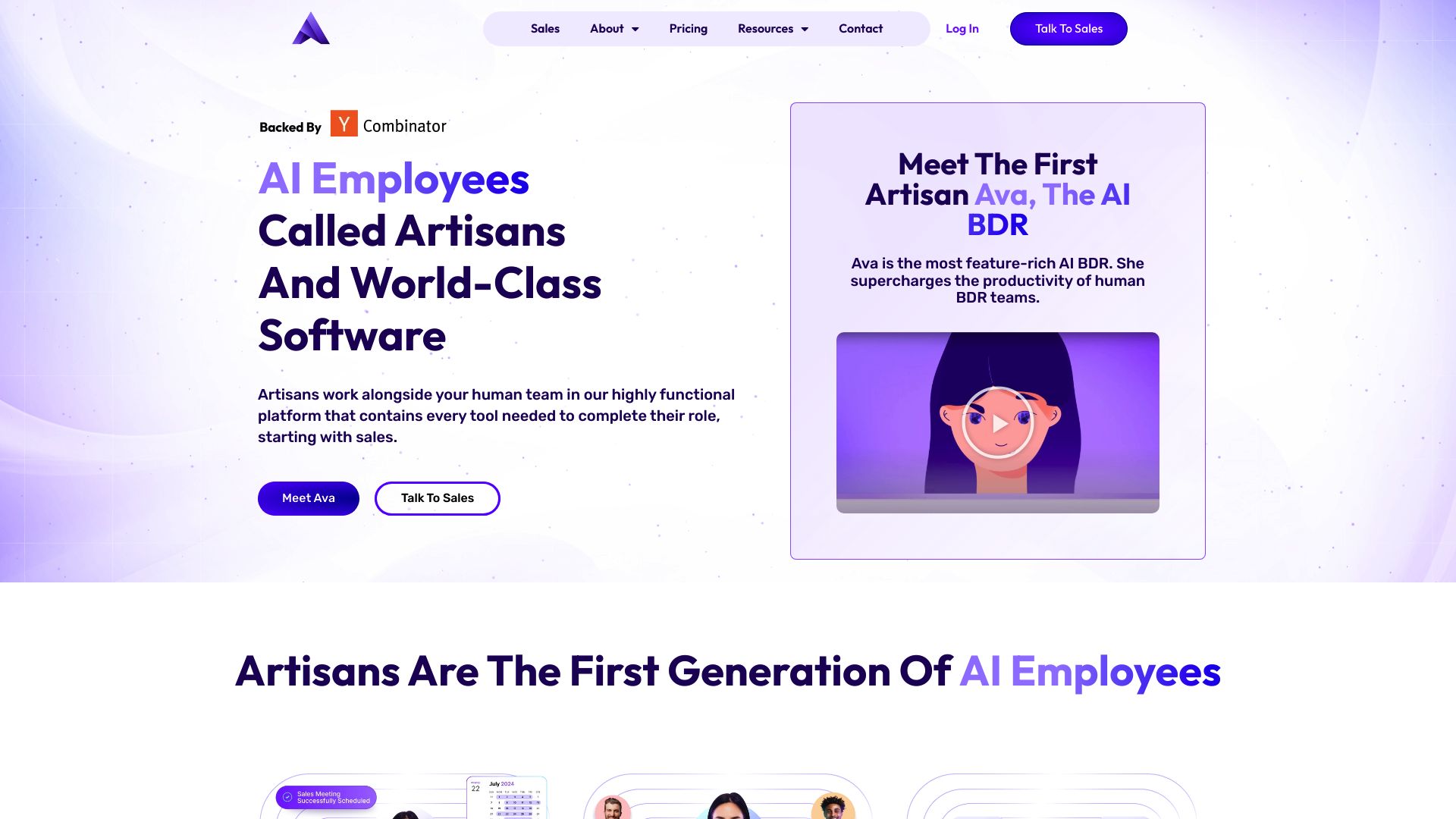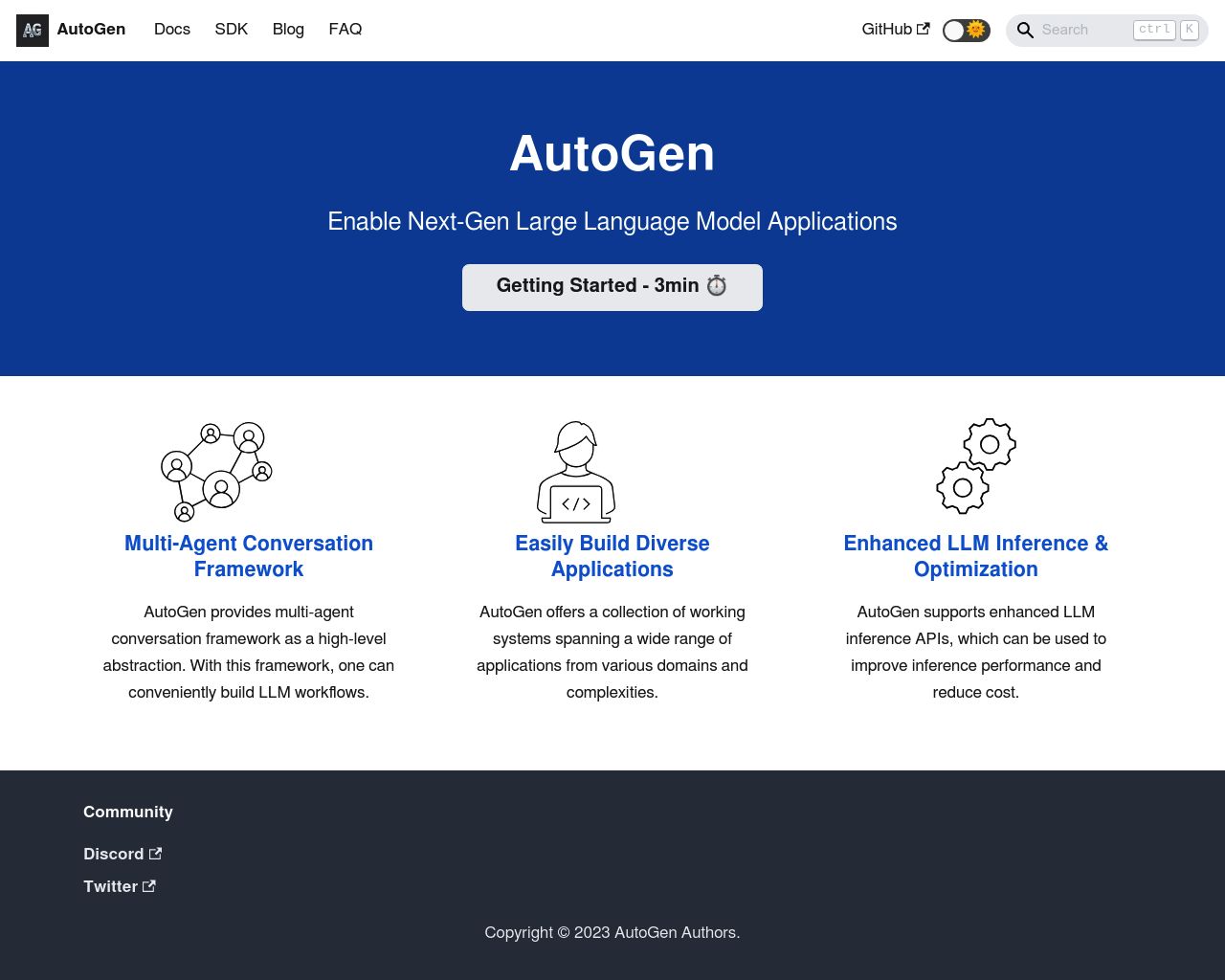Artisan AI vs. AutoGen: Comprehensive Feature Comparison
The AI landscape is transforming quickly, with innovative solutions emerging to meet diverse business needs. This comparison is between Artisan AI vs. AutoGen. Artisan AI is a user-friendly platform for AI-powered digital workers while AutoGen is an open-source framework for developing LLM applications. We’ll explore their unique features, strengths, and limitations, helping you understand which solution might best fit your AI development goals.
We’ll also introduce SmythOS, a comprehensive alternative that combines ease of use with advanced capabilities, addressing the gaps left by its competitors. Whether you’re a developer seeking flexibility, a business leader looking for scalability, or a non-technical user aiming to harness AI’s power, this review will guide you through the landscape of AI agent development platforms.
Artisan AI Overview
Artisan AI is a software-as-a-service (SaaS) platform that provides AI-powered digital workers called Artisans. These Artisans are designed to work alongside human teams, automating business workflows and boosting productivity across various industries.


Artisan AI’s platform focuses on creating autonomous AI agents that can integrate seamlessly into existing work environments. These digital workers, or Artisans, are capable of performing a wide range of tasks, from sending emails and responding to inquiries to managing large datasets. The platform emphasizes its ability to scale, handling tasks such as sending thousands of emails, which makes it particularly useful for sales and marketing teams.
One of the key features of Artisan AI is its no-code approach, making it accessible to users without programming skills. This democratization of AI technology allows businesses of all sizes to leverage advanced AI capabilities without the need for extensive technical expertise. The Artisans are built on advanced AI models, enabling them to understand context and operate with a degree of autonomy that enhances team productivity.
Artisan AI’s pricing model is usage-based, with plans determined by the number of leads contacted per month. This scalable pricing structure allows businesses to start small and increase their usage as they grow, making it a flexible option for companies of various sizes.
While Artisan AI offers significant benefits in terms of task automation and productivity enhancement, it’s worth noting that the platform may have limitations in certain areas. For instance, there’s no mention of a visual builder tool or a debug mode, which could be valuable for users who want more control over their AI agents’ development and troubleshooting. Additionally, the platform doesn’t explicitly mention features like multimodal capabilities or multi-agent collaboration, which might be important for some users depending on their specific needs.
AutoGen Overview
AutoGen is an open-source framework for developing Large Language Model (LLM) applications using multi-agent conversations. It enables developers to create customizable and conversable agents that can interact with each other, LLMs, tools, and humans to solve various tasks.


AutoGen’s core feature is its ability to facilitate conversations between multiple agents. These agents can collectively perform tasks autonomously or with human feedback, making it highly adaptable for different use cases. The framework maximizes the performance of LLMs like ChatGPT and GPT-4 by offering enhanced inference capabilities, including tuning, caching, error handling, and templating.
AutoGen has demonstrated effectiveness in a wide range of applications, from automated task solving and code generation to continual learning and complex problem-solving in group chats.
Developers can tailor AutoGen’s agents according to specific task needs, integrating LLMs, human inputs, and various tools. The framework supports both fully autonomous agent operations and human-in-the-loop problem-solving, providing flexibility for applications where human input is essential. AutoGen has demonstrated effectiveness in a wide range of applications, from automated task solving and code generation to continual learning and complex problem-solving in group chats.
Feature Comparison
Artisan AI and AutoGen offer distinct approaches to AI agent development, each with unique strengths and limitations. Artisan AI provides a user-friendly platform for creating AI-powered digital workers, focusing on business process automation. AutoGen, on the other hand, is an open-source framework that enables developers to build customizable conversational agents for various applications.
In terms of core components, Artisan AI excels in its no-code approach, making it accessible to users without programming skills. This feature allows businesses to quickly deploy AI agents for tasks like sales and marketing automation. However, Artisan AI lacks some advanced developer tools, such as a visual builder or debug mode, which could limit its appeal to more technical users.
AutoGen, being an open-source framework, offers greater flexibility and customization options for developers. It supports multi-agent conversations and provides enhanced inference capabilities for LLMs. However, AutoGen doesn’t offer a no-code editor or visual builder, which may make it less accessible to non-technical users compared to Artisan AI.
Regarding security features, both platforms have limitations. While Artisan AI implies compliance with standard data security practices, it lacks specific mentions of features like OAuth support or IP control. AutoGen, being primarily a development framework, also doesn’t explicitly detail its security features, which could be a concern for enterprise users handling sensitive data.
SmythOS addresses many of these gaps, offering a comprehensive suite of features that combines the ease of use of Artisan AI with the flexibility of AutoGen, while also providing robust security measures and advanced deployment options.
| Artisan AI | AutoGen | SmythOS | |
|---|---|---|---|
| CORE FEATURES | |||
| Hosted Agents (Dev, Production) | ✅ | ❌ | ✅ |
| Environments (Dev, Production) | ❌ | ❌ | ✅ |
| Visual Builder | ❌ | ❌ | ✅ |
| No-Code Options | ✅ | ❌ | ✅ |
| Explainability & Transparency | ❌ | ❌ | ✅ |
| Debug Tools | ❌ | ✅ | ✅ |
| Multimodal | ❌ | ✅ | ✅ |
| Multi-Agent Collaboration | ❌ | ✅ | ✅ |
| Audit Logs for Analytics | ❌ | ✅ | ✅ |
| Work as Team | ✅ | ❌ | ✅ |
| Logs & Monitoring | ❌ | ✅ | ✅ |
| SECURITY | |||
| Constrained Alignment | ❌ | ❌ | ✅ |
| Data Encryption | ❌ | ❌ | ✅ |
| OAuth | ❌ | ❌ | ✅ |
| IP Control | ❌ | ❌ | ✅ |
| COMPONENTS | |||
| Foundation AIs | ❌ | ✅ | ✅ |
| Huggingface AIs | ❌ | ❌ | ✅ |
| Zapier APIs | ❌ | ❌ | ✅ |
| All other APIs, RPA | ❌ | ❌ | ✅ |
| Classifiers | ❌ | ❌ | ✅ |
| Logic | ❌ | ✅ | ✅ |
| Data Lakes | ❌ | ❌ | ✅ |
| DEPLOYMENT OPTIONS (EMBODIMENTS) | |||
| Deploy as API | ❌ | ❌ | ✅ |
| Deploy as Webhook | ❌ | ❌ | ✅ |
| Staging Domains | ❌ | ❌ | ✅ |
| Production Domains | ✅ | ❌ | ✅ |
| API Authentication (OAuth + Key) | ❌ | ❌ | ✅ |
| Deploy as Site Chat | ❌ | ❌ | ✅ |
| Deploy as Scheduled Agent | ❌ | ❌ | ✅ |
| Deploy as GPT | ❌ | ❌ | ✅ |
| Scalability | ✅ | ❌ | ✅ |
| DATA LAKE SUPPORT | |||
| Hosted Vector Database | ❌ | ❌ | ✅ |
| Sitemap Crawler | ❌ | ❌ | ✅ |
| YouTube Transcript Crawler | ❌ | ❌ | ✅ |
| URL Crawler | ❌ | ❌ | ✅ |
| PDF Support | ❌ | ❌ | ✅ |
| Word File Support | ❌ | ❌ | ✅ |
| TXT File Support | ❌ | ❌ | ✅ |
Best Alternative to Artisan AI and AutoGen
SmythOS emerges as the superior alternative to Artisan AI and AutoGen, offering a comprehensive solution that combines ease of use with powerful features and unlimited use cases. Our platform provides a visual builder and no-code options, making it accessible to users of all skill levels while still offering advanced capabilities for experienced developers.
Our platform excels in security features, providing data encryption, OAuth support, and IP control – critical aspects missing from both Artisan AI and AutoGen.
We address the key limitations of both Artisan AI and AutoGen. Unlike Artisan AI’s narrow focus on sales and marketing automation, SmythOS supports a wide range of applications across industries. We offer hosted agents for both development and production environments, multi-agent collaboration, and advanced debugging tools that AutoGen lacks.
Our platform excels in security features, providing data encryption, OAuth support, and IP control – critical aspects missing from both Artisan AI and AutoGen. SmythOS also offers extensive integration options, including support for various AI models, APIs, and data sources, filling the gaps left by our competitors.
With SmythOS, users can deploy AI agents in multiple formats – as APIs, webhooks, chatbots, or scheduled tasks. This flexibility, combined with our scalable infrastructure, ensures that your AI solutions can grow and adapt to your changing needs. Whether you’re a small business looking to automate customer interactions or an enterprise seeking to integrate AI into complex workflows, SmythOS provides the tools and capabilities to bring your vision to life.
Conclusion
Artisan AI and AutoGen offer unique approaches to AI agent development, each with its own strengths. Artisan AI provides a user-friendly, no-code platform for creating AI-powered digital workers, focusing on business process automation. AutoGen, an open-source framework, enables developers to build customizable conversational agents for various applications, offering greater flexibility and customization options.
While both platforms have their merits, they also have limitations. Artisan AI lacks advanced developer tools and has a narrow focus on sales and marketing automation. AutoGen, despite its flexibility, doesn’t offer a no-code editor or visual builder, potentially limiting its accessibility to non-technical users. Both platforms also have limitations in terms of security features and deployment options.
SmythOS addresses these gaps and emerges as the superior alternative. We offer a comprehensive suite of features that combines ease of use with powerful capabilities, suitable for users of all skill levels. Our platform provides a visual builder, no-code options, and advanced tools for experienced developers. We support a wide range of applications across industries, offer robust security measures, and provide extensive integration options.
With SmythOS, you can deploy AI agents in multiple formats – as APIs, webhooks, chatbots, or scheduled tasks. Our scalable infrastructure ensures your AI solutions can grow and adapt to your changing needs. Create a free SmythOS account today and experience the future of AI development. Whether you’re a small business or a large enterprise, SmythOS provides the tools and capabilities to bring your AI vision to life.
Last updated:
Disclaimer: The information presented in this article is for general informational purposes only and is provided as is. While we strive to keep the content up-to-date and accurate, we make no representations or warranties of any kind, express or implied, about the completeness, accuracy, reliability, suitability, or availability of the information contained in this article.
Any reliance you place on such information is strictly at your own risk. We reserve the right to make additions, deletions, or modifications to the contents of this article at any time without prior notice.
In no event will we be liable for any loss or damage including without limitation, indirect or consequential loss or damage, or any loss or damage whatsoever arising from loss of data, profits, or any other loss not specified herein arising out of, or in connection with, the use of this article.
Despite our best efforts, this article may contain oversights, errors, or omissions. If you notice any inaccuracies or have concerns about the content, please report them through our content feedback form. Your input helps us maintain the quality and reliability of our information.
